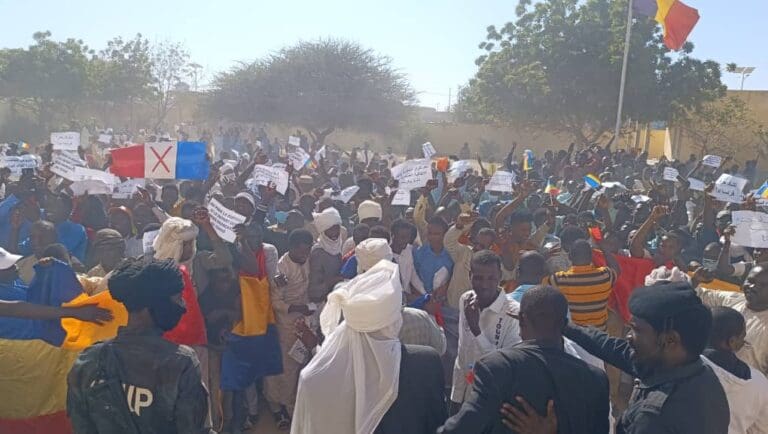Abéché has witnessed the first public mobilisation of the population in support of the Chadian government’s decision to end security cooperation with former colonial power France.
A large pro-regime demonstration was held on Thursday 5 December in Abéché, the capital of Ouaddai province (east).
Initiated by the local authorities, the demonstration brought together hundreds of the city’s inhabitants to Independence Square.
On motorbikes or on foot, the demonstrators marched for several kilometres before reaching the Independence Square, their rallying point. Scraps of paper bore inscriptions such as «Tchad Hourra, France barra», “Yes to the break-up and departure of French forces from Chad.”
“This is a historic moment for our country. And the people of Abéché wanted to show their solidarity with our authorities,” said the mayor of the town, Mahamat Saleh Ahmat Adam.
With this mobilisation, the people of Abéché are the first to publicly express their support for the Chadian authorities. A French military base is located in the town.
On 4 December, a special commission was set up to monitor the implementation of the termination of the military cooperation agreement between Chad and France.
Reporting directly to the prime minister, Allamaye Halina, the commission’s main task is to officially notify the French authorities of the termination of the agreement and to draw up a detailed plan for the implementation of the commitments set out in the agreement.
It is chaired by the Minister of State, Minister of Foreign Affairs, and includes the Minister of the Armed Forces (Vice-Chairman), the Minister of Territorial Administration (Rapporteur) and several other senior officials. Its running costs are covered by the state.
The National Transitional Council (CNT), which met in a plenary session on 3 December, adopted by an overwhelming majority (137 out of 149 votes) a resolution backing this decision, which it described as “historic and sovereign.”
Its president, Dr Haroun Kabadi, urged the government to speed up its implementation.
At a press conference on 1 December, President Mahamat Idriss Deby Itno described the decision as ‘a carefully considered and fully accepted act’ and stressed the need for Chad to ‘redefine its partnerships according to its national priorities’, while respecting the provisions for a harmonious transition.
Military cooperation between Chad and France, which dates back to the 1960s, was reviewed in 2019 but has come under increasing criticism.
According to the Chadian government, this break does not alter the historical and friendly relations between the two countries, which wish to maintain constructive exchanges in other spheres.
The decision, taken on 28 November, coincides with a reconfiguration of France’s military presence in Africa.
Although Paris had taken note of the move, it came as a surprise to France, especially following a trip to Chad by French foreign minister Jean-Noël Barrot.
With around a thousand French soldiers still on its soil, Chad is beginning to transition within a context marked by crucial security issues.
CA/sf/ac/lb/as/APA


